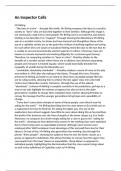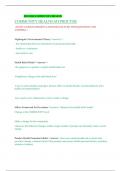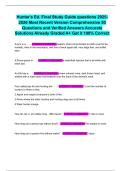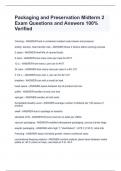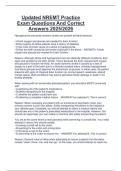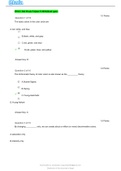Mr Birling:
- “like bees in a hive” – through this simile, Mr Birling compares the idea of a socialist
society to “bees” who are bunched together in their beehive. Although this image is
not necessarily a bad one to most people, Mr Birling sees it as restrictive and almost
limiting as he describes it as “trapped”. Through showing the disturbance Mr Birling
sees in a socialist society, he shows just how immoral and thoughtless those at the
top of a capitalist society are to the point the of ideas of working together and caring
for each other (the core values of socialism) feeling restrictive due to the fact that he
is unable to succeed economically and feel superior to others. Moreover, bees are
known to connote teamwork and working diligently for a common goal (honey).
Therefore, by comparing socialism to “bees in a hive”, Priestley alludes to the
benefits of a socialist society where there are no distinct class divisions separating
people and everyone is treated equally, which would essentially diminish the
inequality of wealth during the Edwardian era
- “unsinkable, absolutely unsinkable” – Priestley employs a sense of irony as the play
was written in 1945 after the sinking of the titanic. Through this irony, Priestley
presents Mr Birling as foolish to an extent to show how unsuitable people like him
are to ruling society, allowing him to criticise the old, upper-class men who held
control over Edwardian society. Moreover, through the use of the adverb
“absolutely”, it shows Mr Birling’s complete certainty in his predictions, perhaps as a
way to not only highlight his extreme arrogance but also to hint at the older
generations’ inability to change their outdated views, further allowing Priestley to
convey his message that the younger generations bring hope and a possibility of
change.
- “if you don’t come down sharply on some of these people, soon they’d soon be
asking for the earth” – Mr Birling describing how he came down on Eva Smith acts as
a euphemism for how he fired her for asking for higher pay. The use of the
euphemism here almost suggests how little he cares about doing this as he prioritises
the profit of his business over the lives of people in the lower classes e.g. Eva Smith.
Moreover, he compares Eva Smith simply asking for a raise in pay to her “asking for
the earth”, showing just how abhorrently women in the working class were exploited
due to them being seen as expendable (Context: although more women were
employed after WW2 employers took advantage of this and paid them less for their
labour). On top of this, Mr Birling also generalises the working class through the
phrase “these people”, showing the audience how he sees the lower classes as a
group as opposed to individuals. This allows Priestley to convey how the upper class
saw people from the lower classes as expendable, cheap labour as opposed to
individual people, highlighting the discrimination that the class system brings about
as well as the selfishness of Capitalists such as Mr Birling
, Mrs Birling:
- “Really the things you girls come up with these days”- Condemns the use of
colloquialism and generalises all girls through the phrase “you girls” suggestive of the
ingrained doctrine that she holds entailing that women are below men (patriarchy).
Moreover, the scolding of Sheila for using colloquial ‘slang’ hints at the stubbornness
of the older generation and their inability to change, reinforcing Priestley’s message
that the younger generation are the ones to bring about hope for change in society.
- “girls of that class” / “girls of that sort” generalisation of all working-class girls as
she sees them as inferior, through the use of the relative pronoun “that”, she
dissociates herself from Eva Smith as she sees her as below her in value. The
irrationality of Mrs Birling’s discrimination towards the working class is further
exacerbated by the parallelism between Eva Smith and Sheila. Both characters are
described as “pretty” and young women, however due to the class that she was born
into she is mistreated and abused by Mrs Birling and the upper class. Priestley does
this perhaps to highlight the unfairness of the class system as although it is a factor
which cannot be decided by an individual, how they are treated in life is determined
by it.
- “I accept no blame for it at all” – By saying this, Mrs Birling makes it sound as if she
has the authority to choose whether she takes the blame for Eva Smith’s suicide,
showing just how ignorant she is to her actions due to her familiarity with abusing
her power to avoid consequence. This idea of Mrs Birling thinking she can escape the
situation abusing her social status is further explored by Priestley through the order
of the sentence. Priestley perhaps orders the sentence with the pronoun “I” at the
start to suggest how Mrs Birling, like many upper class members of Victorian society,
prioritises her reputation over the lives of working class people - in this case Eva
Smith - and refuses to take responsibility.
Gerald:
- “I suppose it was inevitable” - he claims that their interaction was unavoidable,
highlighting how common it was for upper class men to abuse their power immorally
on lower class women
“Inevitable” means unavoidable or unchangeable and holds connotations with an
unwavering destiny or fate. However, the fact that Gerald uses his social status to
force Eva Smith into his dependence juxtaposes with this as he described to be able
to control her fate. Priestley uses this to show how morally unacceptable it is for a
person to be able to control and manipulate another person just because of their
social status or class and suggests socialism and a removal of the class system as a
way to prevent this sort of abuse of power
- “so, I broke it off definitely before I went” - shows Gerald’s authority within the
relationship as he holds the power to break it off
The verb “broke” could be referencing not only the relationship but Eva Smith
herself. The fact that Gerald is able to do this enforces Priestley’s message and


